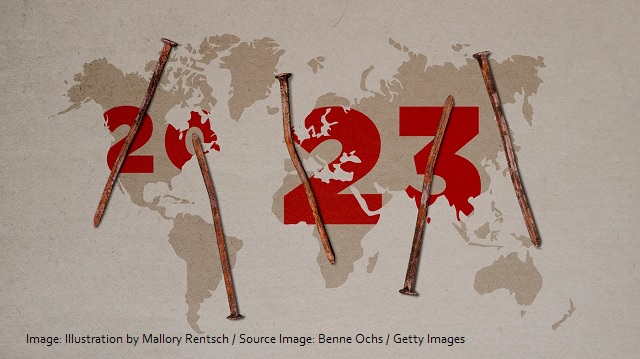The Most Persecuted Peoples in the World—The Followers of Jesus of Nazareth

In a Christianity Today article titled “The 50 Countries Where It’s Hardest to Follow Jesus” the CT Editors report,
More than 5,600 Christians were killed for their faith last year. More than 2,100 churches were attacked or closed.
More than 124,000 Christians were forcibly displaced from their homes because of their faith, and almost 15,000 became refugees.
Sub-Saharan Africa—the epicenter of global Christianity—is now also the epicenter of violence against Christians, as Islamist extremism has spread well beyond Nigeria.
And North Korea is back at No. 1, according to the 2023 World Watch List (WWL), the latest annual accounting from Open Doors of the top 50 countries where it is most dangerous and difficult to be a Christian.
[ … ]
Islamic extremism continues to cause the most persecution (31 nations), especially in sub-Saharan Africa where Open Doors fears Nigeria will soon trigger “a vast humanitarian catastrophe” across the continent. Researchers also noted how China has increased digital restrictions and surveillance and is “forging a network of nations seeking to redefine human rights—away from universal standards and religious freedoms.” And a fourth Latin American country, Nicaragua, entered the list as authoritarian governments increasingly view Christians as voices of opposition.
[ … ]
Of the top 50 nations:
- 11 have “extreme” levels of persecution and 39 have “very high” levels. Another five nations outside the top 50 also qualify as “very high”: Kenya, Kuwait, Tanzania, United Arab Emirates, and Nepal. (Then OD tracks another 21 with “high” levels. The only nations to rise in level were Nicaragua and Sudan, while Saudi Arabia and Sri Lanka were the only nations to drop in level.)
- 19 are in Africa, 27 are in Asia, and 4 are in Latin America.
- 34 have Islam as a main religion, 4 have Buddhism, 1 has Hinduism, 1 has atheism, 1 has agnosticism—and 10 have Christianity. (Nigeria is 50/50 Muslim-Christian.)
Where It’s Hardest to Follow Jesus:
1. North Korea
2. Somalia
3. Yemen
4. Eritrea
5. Libya
6. Nigeria
7. Pakistan
8. Iran
9. Afghanistan
10. Sudan
11. IndiaWhere Christians Were Martyred Most:
1. Nigeria: 5,014
2. Name withheld: 100*
3. Mozambique: 100*
4. Democratic Republic of Congo 100*
5. Central African Republic: 61
6. Myanmar: 42
7. Colombia: 21
8. India: 17
9. Mexico: 14
10. Honduras: 14
11. Pakistan: 12*Estimate | Open Doors reporting period: Oct. 2021 to Sept. 2022
Where it’s hardest to follow Jesus
Here are some of the nations where it’s hardest to follow Jesus:
North Korea #1
North Korea has returned to no. 1 with the highest levels of persecution ever seen. Its score of 98, an all-time high, reflects an increase in arrests of Christians, and house-churches discovered and closed – under the new ‘anti-reactionary thought law’.
Nigeria #6
Christians continue to be brutally attacked in Northern Nigeria. Boko Haram, ISWAP, Fulani militants and other armed bandits have conducted devastating raids on Christian communities. The government continues to deny this is religious persecution, so violations of Christians’ rights have been carried out with impunity.
China #16
In China, the use of digital surveillance technology is spreading, adding to persecution and intimidation. As digital tools became more sophisticated, so did the Chinese government. Beijing employed censorship, disinformation and unblinking surveillance to ratchet up control
Nicaragua #50
Nicaragua has entered the top 50 for the first time. This reflects government repression which escalated since the April 2018 protests. The reputation of authority and legitimacy the Church has in the country has made it a particular target. Church buildings were damaged, TV stations and colleges closed, religious leaders expelled.
Primary Sources of Christian Persecution
Open Doors categorizes the primary sources of Christian persecution into eight groups:
Islamic oppression (31 countries): This is the main source of persecution that Christians face in more than half of the watch list countries, including 8 of the top 10 overall. Most of the 31 are officially Muslim nations or have Muslim majorities; however, 5 actually have Christian majorities: Nigeria, CAR (No. 24), DRC (No. 37), Mozambique (No. 32), and Cameroon (No. 45). (Additionally this is the main driver in 15 nations with enough persecution to be tracked by Open Doors but ranking below the watchlist’s cutoff, including Christian-majority Kenya and Tanzania.)
Dictatorial paranoia (9 countries): This is the main source of persecution that Christians face in nine countries, mostly in nations with Muslim majorities—Syria (No. 12), Uzbekistan (No. 21), Turkmenistan (No. 26), Bangladesh (No. 30), Tajikistan (No. 44), and Kazakhstan (No. 48)—but also in Eritrea (No. 4), Cuba (No. 27), and Nicaragua (No. 50). (Also in six nations being tracked: Angola, Azerbaijan, Belarus, Burundi, Rwanda, and Venezuela.)
Communist and post-communist oppression (4 countries): This is the main source of persecution that Christians face in four countries, all in Asia: North Korea (No. 1), China (No. 16), Vietnam (No. 25), and Laos (No. 31).
Religious nationalism (3 countries): This is the main source of persecution that Christians face in three nations, all in Asia. Christians are primarily targeted by Hindu nationalists in India (No. 11) and by Buddhist nationalists in Myanmar (No. 14) and Bhutan (No. 40). (Also in three nations being tracked: Israel, Nepal, and Sri Lanka.)
Organized crime and corruption (2 countries): This is the main source of persecution that Christians face in Colombia (No. 22) and Mexico (No. 38). (Also in three nations being tracked: El Salvador, Honduras, and South Sudan.)
Christian denominational protectionism (1 country): This is the main source of persecution that Christians face in Ethiopia (No. 39).
Secular intolerance (0 countries) and clan oppression (0 countries): Open Doors tracks these sources of persecution, but neither is the main source in any of the 50 countries on the 2023 list.
©2023. Dr. Rich Swier. All rights reserved.


Leave a Reply
Want to join the discussion?Feel free to contribute!